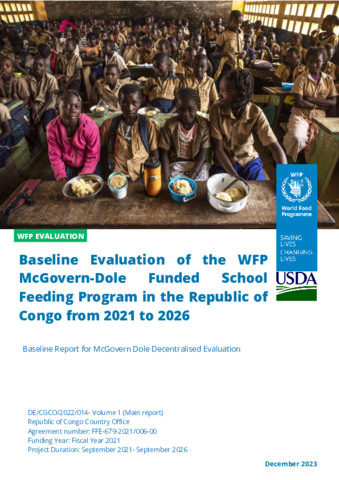
This decentralized evaluation was commissioned by the WFP Republic of Congo Country Office and covers the United States Department of Agriculture's (USDA) Foreign Agricultural Services (FAS) funded five-year school feeding project under the McGovern-Dole Food for Education Program covering the period 2021–2026. It was carried out in 2023.
The baseline evaluation focused on the Performance Monitoring Plan (PMP) and the indicators that will be used for monitoring and tracking results of activities that will be implemented to meet the objectives of the project. The baseline was purposed to establish situational analysis before the beginning of the McGovern-Dole programme FY21 and to develop learnings on the most efficient approach to monitor the programme indicators in the PMP. The evaluation covered school feeding, nutrition and capacity strengthening.
Key evaluation findings included:
- The project includes well-designed gender-sensitive indicators to track impact across various target groups. However, it lacks equity-focused indicators that address the diverse social contexts, needs, and barriers faced by different populations.
- While the Theory of Change (ToC) outlines logical linkages across key elements and integrates gender considerations particularly for girls, boys, vulnerable children and women farmers, its linear structure does not fully capture the complexities of contextual interdependencies, and it omits explicit reference to rural and autochthonous populations.
- Notably, autochthone children are disproportionately affected by the absence of school meals, often leading to irregular school attendance.
- Stakeholders identified poor school infrastructure such as inadequate functional drinking water points, absence of separate latrines, and lack of accessible facilities for learner with disabilities, as key deterrents to enrolment and learning, especially among girls and learners with special needs.
- Teaching quality is undermined by a reliance on untrained volunteer teachers, who in many schools constitute the majority of staff (about 60 percent), with headteachers often being the sole government-employed staff.
- Early grade reading assessments reflect low reading proficiency levels, further constrained by limited access to reading and math textbooks especially in the intervention group, which trails the comparison group in textbook availability.
- The existence of a program monitoring dashboard was recognised as a strength of the M&E system, providing consolidated school-level data on monthly basis.
- The programme's sustainability is challenged by low investment in agriculture, informal local supplier engagement, weak collaboration mechanisms and unpredictable pricing, which discourage consistent participation from farmers and traders whose involvement is driven mainly by economic incentives.
- Despite an enabling legal and policy framework aligned with national development goals, and longstanding support from WFP in policy development, significant challenges persist. These include insufficient financial commitment to implementing and scaling a nutrition-sensitive National School Feeding Programme (NSFP), although national-level institutional capacity has shown some improvement.
